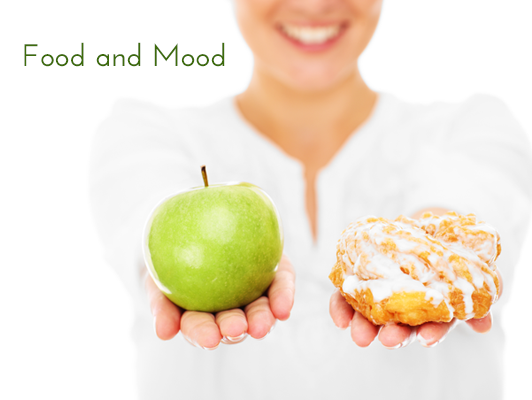Does food alter your mood?
We all know that our mood can sometimes impact our food choices. Do you ever find yourself reaching for a doughnut, bag of potato chips, or sugary drink when you’re feeling stressed? It’s really common! But can our food choices affect our mood? Some research is suggesting it may, at least in part.
It is important to note that there is no food that can remedy clinical depression, but healthy habits may be helpful as part of the treatment plan.
Research in this area is very exciting. We don’t know all the answers to how food affects mood, and we don’t know a lot of the “whys” of it — but there is enough evidence so far to make it worth trying these tips for health and happiness:
Start the day right with a balanced breakfast.
Eating breakfast has been shown to improve memory, provide more energy during the day, and lead to feelings of calmness. It’s not just children who need a full belly to do well! Balance your breakfast with a few ounces of lean protein, healthy fats, fruit, and whole grains.
Eat more omega-3 rich foods.
Omega-3 fatty acids are found in fatty fish (like tuna, salmon and sardines), flaxseeds, and walnuts. Studies have gone back and forth over the years on the ability of omega-3s to protect against depression. Recent studies suggest the link may not be as strong as previously thought. There are, however, plenty of health benefits to increasing servings of these foods. Aim to eat fish two times a week, and other omega-3 sources daily.
Go “smart” carb.
Carbohydrates are needed for the production of serotonin, known as the “feel-good hormone.” If your brain isn’t producing enough serotonin, your mood is likely to suffer, as is your sex drive and ability to sleep well. In fact, dulled moods are so commonplace among low-carb dieters, the term “Atkins Attitude” was coined to describe it, according to Judith Wurtman, director of the Women’s Health Program at the Massachusetts Institute of Technology.
It’s important to choose healthy carbohydrates that offer fiber and lots of nutrition over highly refined and processed carbohydrates. Choose more whole grains, fruits, vegetables, and legumes to be “carb smart.”
“D” isn’t for depression.
Vitamin D also increases your serotonin levels. Your skin has the ability to make vitamin D from cholesterol using sunlight. But here in Pittsburgh and other regions of the country where cloudy days are more prevalent, that ability can be impaired. We have to get more of our vitamin D from food. Foods high in vitamin D include certain fish (like herring, salmon, and halibut), milk, and fortified milk substitutes (like soy milk).
“B” good to yourself.
A recent study found that men who had a poor intake of folate and women who had a poor intake of vitamin B12 both had higher rates of depression. It’s still unclear if poor nutrition causes depression, or if depression causes worse nutrition. But this isn’t the first study to find a link between these two B vitamins and depression.
Foods high in folate are Mediterranean diet staples: legumes, nuts, some fruit, and dark green leafy vegetables. Lean animal products like fish and low-fat dairy are good sources of B12. Find out more about the Mediterranean diet here and here.
Add selenium to your diet.
Several studies have now found an association between low selenium intake and poorer mood. One study found an improvement in mild to moderate depression symptoms in people who received selenium supplements over a seven-week period.
More studies are needed in this area, but foods rich in selenium are foods we all know we should eat more of anyway: seafood, nuts and seeds, lean meat, whole grains, beans and legumes and low-fat dairy. Try to get your selenium from food sources — toxic doses of selenium are possible from supplements, but rare from food.
Decaffeinate.
In people who are sensitive, caffeine may worsen symptoms of depression and anxiety. Try slowly reducing your caffeine consumption to avoid excessive fatigue and headaches. Making sure to get a good night’s sleep can help ensure you won’t feel the need to over-indulge in caffeine.
Keep moving!
It is well documented that physical activity can improve mood. But did you know that, in some people, it is as effective at relieving depression symptoms as medication? (Of course, you should never stop using any prescribed medication without talking to your doctor!) Exercise activates the production of those “happy” hormones, endorphins, which trigger an overall positive feeling and reduce your perception of pain. Exercise is also known to improve sleep, which in turn can improve mood.
Even if you don’t have time for an hour-long workout session, just a 10-minute brisk walk around the block can be enough for a quick pick-me-up. Try to work up to at least 150 minutes over the whole week.
Do you have a feel-good trick that’s also good for you? Share it in the comments below!




